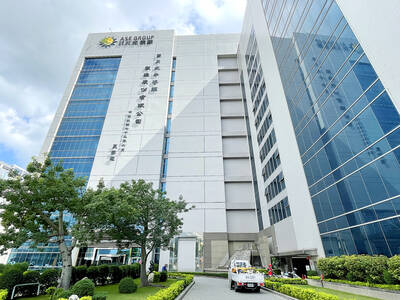The nation’s tax revenue last month rose NT$52.6 billion (US$1.67 billion), or 53.2 percent from a year earlier, to NT$151.4 billion, with business income taxes posting the largest growth, the Ministry of Finance said yesterday.
Revenue from business income taxes climbed NT$2.5 billion, or 222.3 percent year-on-year, to NT$3.6 billion last month, the ministry said.
This was followed by land value increment taxes, which increased 91.9 percent to NT$7.1 billion, and sales tax revenue, which grew 78.5 percent to NT$67.8 billion, the ministry said.
“Tax revenues last month rose mainly because of a recovering economy, with customs tariffs, income, commodity, sales and land incremental value taxes all rising, Lin Lee-jen (林麗貞), head of the ministry’s statistics department, told a press briefing yesterday.
Lin also attributed the revenue increase to NT$23.8 billion in customs tariffs collected in February and taxes from year-end bonuses that were entered into account books last month.
Cumulative tax revenues in the first three months of the year rose 20.2 percent year-on-year to NT$295.2 billion, 7.5 percent higher than the government’s budget for the period, the ministry said, adding that land value increment taxes saw the largest increase from a year ago.
During the quarter, tax gains from rising land value jumped NT$9.6 billion, or 107.9 percent year-on-year, to NT$18.6 billion, followed by securities transaction taxes at 67.6 percent and business income taxes at 38.1 percent.
Lin said that growth in land value increment taxes pointed to a booming real estate market, adding that the increase was the largest in six years.
Revenue from business taxes in the first three months rose NT$16.4 billion, or 24.8 percent year-on-year, to NT$82.3 billion, thanks to increased domestic spending and imports, she said.

EXPANSION: The investment came as ASE in July told investors it would accelerate capacity growth to mitigate supply issues, and would boost spending by 16 percent ASE Technology Holding Co (ASE, 日月光投控), the world’s biggest chip assembly and testing service provider, yesterday said it is investing NT$17.6 billion (US$578.6 million) to build a new advanced chip packaging facility in Kaohsiung to cope with fast-growing demand from artificial intelligence (AI), high-performance-computing (HPC) and automotive applications. The new fab, called K18B, is to commence operation in the first quarter of 2028, offering chip-on-wafer-on-substrate (CoWoS) chip packaging and final testing services, ASE said in a statement. The fab is to create 2,000 new jobs upon its completion, ASE said. A wide spectrum of system-level chip packaging technologies would be available at

Taiwan’s foreign exchange reserves hit a record high at the end of last month, surpassing the US$600 billion mark for the first time, the central bank said yesterday. Last month, the country’s foreign exchange reserves rose US$5.51 billion from a month earlier to reach US$602.94 billion due to an increase in returns from the central bank’s portfolio management, the movement of other foreign currencies in the portfolio against the US dollar and the bank’s efforts to smooth the volatility of the New Taiwan dollar. Department of Foreign Exchange Director-General Eugene Tsai (蔡炯民)said a rate cut cycle launched by the US Federal Reserve

HEAVYWEIGHT: The TAIEX ended up 382.67 points, with about 280 of those points contributed by TSMC shares alone, which rose 2.56 percent to close at NT$1,400 Shares in Taiwan broke records at the end of yesterday’s session after contract chipmaker Taiwan Semiconductor Manufacturing Co (TSMC, 台積電) hit a fresh closing-high amid enthusiasm toward artificial intelligence (AI) development, dealers said. The TAIEX ended up 382.67 points, or 1.45 percent, at the day’s high of 26,761.06. Turnover totaled NT$463.09 billion (US$15.22 billion). “The local main board has repeatedly hit new closing highs in the past few sessions as investors continued to embrace high hopes about AI applications, taking cues from a strong showing in shares of US-based AI chip designer Nvidia Corp,” Hua Nan Securities Co (華南永昌證券) analyst Kevin Su

Nvidia Corp’s major server production partner Hon Hai Precision Industry Co (鴻海精密) reported 10.99 percent year-on-year growth in quarterly sales, signaling healthy demand for artificial intelligence (AI) infrastructure. Revenue totaled NT$2.06 trillion (US$67.72 billion) in the last quarter, in line with analysts’ projections, a company statement said. On a quarterly basis, revenue was up 14.47 percent. Hon Hai’s businesses cover four primary product segments: cloud and networking, smart consumer electronics, computing, and components and other products. Last quarter, “cloud and networking products delivered strong growth, components and other products demonstrated significant growth, while smart consumer electronics and computing products slightly declined,” compared with the